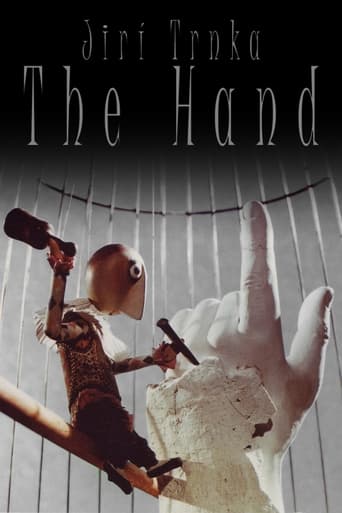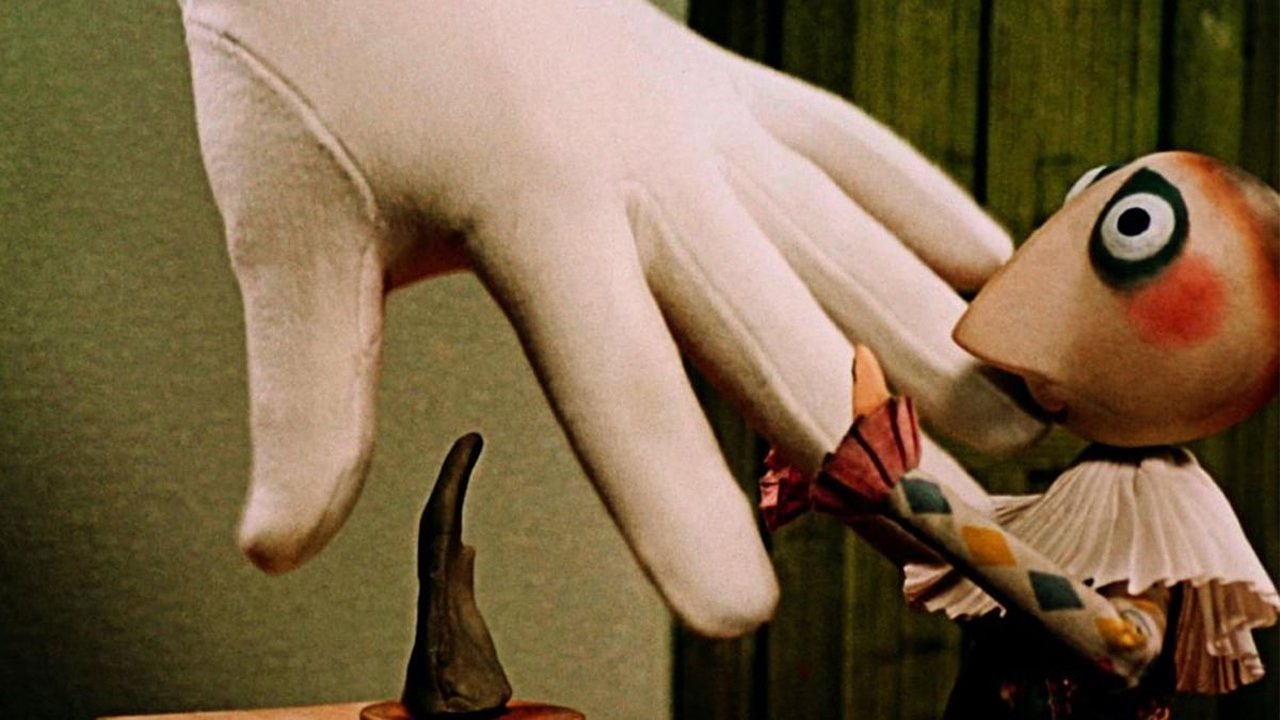Kirpianuscus
a little potter. and his plant. a huge hand. and a statue. one of the most impressive animation. for the simplicity of great art. and for its status of warning. against totalitarian regime. about the resistance against it. about forms of freedom. and its price. so, more than a film. a document. and a testimony. about art as form of free speech in dark ages. this detail does "Ruka " special. a film about fragility. and about its delicate force. as inspired support. for reflection.
Horst in Translation (filmreviews@web.de)
"Ruka" or "The Hand" is an 18-minute short film from Czechoslovakia and this one came out in 1965, which means it had its 50th anniversary last year. It was the last directorial effort by Czechoslovakian filmmaker Jirí Trnka and today we know that it was probably also his biggest success because of the BAFTA nomination it scored. It lost to Norman McLaren's entry by the way. Anyway, if you have seen some other works by Trnka, you will realize that his style is obvious and you can easily identify him as the man behind it. Recognition value is always something positive, but sadly, in my opinion, it's almost the only positive aspect here. It's about a potter who life gets changed considerably for the worse when a big white hand (glove?) appears in his home and starts to harass and bully the poor little guy. So yeah, you see it is an absurd film. That's nothing negative necessarily though if the movie manages to deliver in other areas than realism then. but this one really does not. The animation is okay, but the story is way too long and dragging, even for a film that stays under 20 minutes. There may be references about the filmmaker's country in terms of life, society and maybe also politics, but you won#t get these unless you really know about the history. The good thing here is that there is no dialogue, so you won't need subtitles if you don't speak the Czech language. ItÄs all about sound effects from the audible perspective. But is it really a good thing? I'm not sure and I don't recommend the watch.
Eumenides_0
My discovery of the cinema of Jan Svankmajer opened My eyes to a whole tradition of Czech animation, of which Jirí Trnka was a pioneer. His Ruka is one of the finest, most technically-impressive animated movies I've ever seen.A potter wakes up and waters his plant. Then he goes about making a pot. But in comes the huge hand which crashes the pot and demands that the potter make a statue of itself. He casts the hand out, but soon it returns and imprisons him in a bird cage where he's forced to sculpt a stone hand. He sets about it, fainting from exhaustion, but eventually completes the task.In a marvellous sequence of metacinema, the potter uses a candle to burn his visible puppet strings, which keep him in thrall, and he escapes back home. He shuts himself in and is accidentally killed by his own beloved plant when it falls on his head.This movie doesn't hide the fact it's pure animation, unlike modern movies that strive to be realistic (why?). The hand, for instance, is clearly someone's hand in a glove. Everything else is clay. Strings are visible and are part of the narrative, making it a precursor of the movie Strings. The atmosphere is eerie: that hand going after the little potter managed to instill more dread in me than many horror movies combined.The movie is obvious but it avoids being totally manipulative for its simplicity. it's a fable about artistic freedom and tyranny which can't help winning the heart and mind of anyone who holds freedom as a natural right.
MartinHafer
Generally, I am not a huge fan of stop-motion films and at first RUKA didn't capture my attention. However, knowing that this film was made in the repressive Czechoslovakia during the Soviet-domination era, the more I watched the film, the more I realized just how subversive this innocent looking little film was. This subtext really made the film come to life and gives it real staying power as both a work of art and a political statement.The sad little film is done without any dialog, but it's pretty clear what is happening. A cute little wooden man is making a clay pot and having a lovely time when suddenly a meddling animated hand appears and destroys the pot--making it into a sculpture of a hand instead. Well, the wooden man tries again and again to chase away the hand and do his own thing. However, over time the hand becomes more and more insistent and eventually cages the man. And, by the end, the man is dead thanks to the meddling hand and the hand, in a sign of real hypocrisy, gives the man a hero's funeral! As I said, this film is an obvious attempt by the brave Jirí Trnka to criticize his domineering government. Not surprisingly, though Czechs loved the film and gave it critical praise, the state (i.e., the hand) banned this little parable. Sadly, Trnka did not live to see his nation liberated a little more than two decades later during the co-called "Velvet Revolution".


 AD
AD
